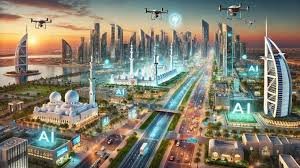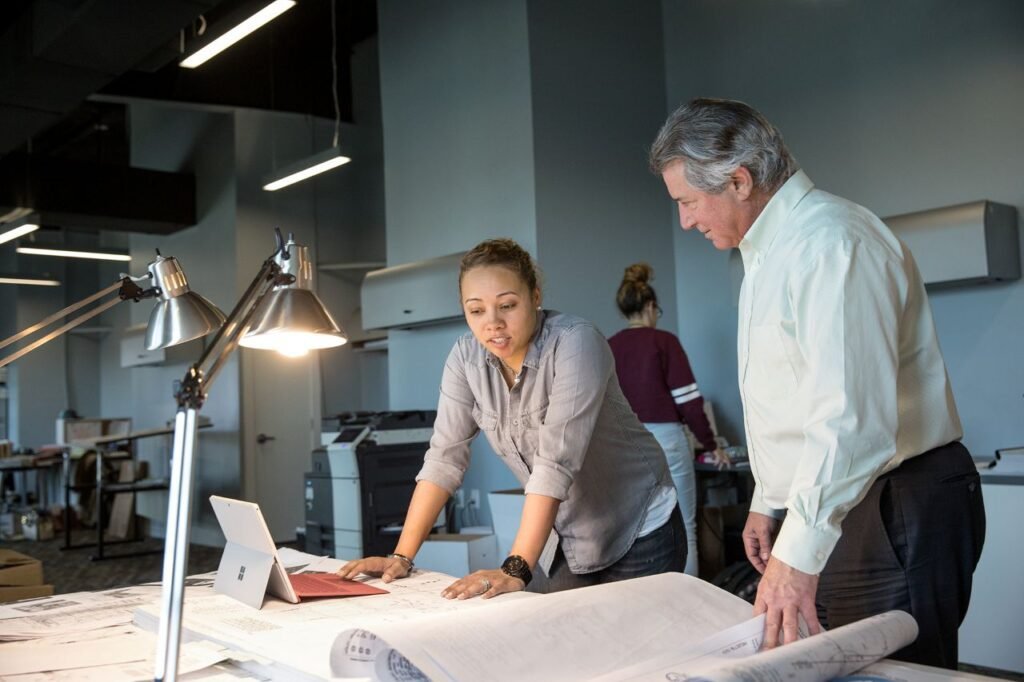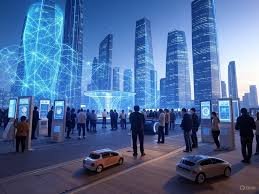There’s a quiet but powerful revolution unfolding in Abu Dhabi. Beyond the towering skyscrapers, serene beaches, and luxury shopping malls, the city is steadily becoming one of the world’s smartest urban environments. While the idea of smart cities once sounded like science fiction — with flying cars and robot assistants — Abu Dhabi is showing the world that the future is less about fantasy and more about meaningful, practical improvements that genuinely enhance people’s everyday lives.
From fixing potholes before drivers even notice them, to creating tailored city experiences based on residents’ needs, the capital of the UAE is redefining what it means to be a modern city powered by artificial intelligence.
A City That Listens to Its People

What makes a city smart isn’t just the number of sensors or cameras it has, but how it uses technology to listen to its people and improve their quality of life. Abu Dhabi has taken this to heart, creating a city that isn’t just connected, but responsive.
Imagine driving to work one morning, and a pothole that appeared overnight has already been detected and logged for repair — without a single complaint being filed. That’s not a future concept; it’s happening in Abu Dhabi right now. AI-powered monitoring systems installed on city vehicles and infrastructure constantly scan the roads, identifying issues like cracks, potholes, and traffic congestion in real time. The information is then sent to a central system where it’s prioritized and assigned to the relevant teams for immediate action.

This level of attentiveness makes residents feel valued. It’s not about flashy gimmicks — it’s about solving problems before they turn into headaches.

More Than Just Roads: A Truly Personalized City
The real magic lies in how Abu Dhabi’s AI systems go beyond maintenance. The city is on a mission to create an environment that adapts to the needs of its citizens. This means using data to understand how people move, live, and interact within the city — then using those insights to make daily life easier and more enjoyable.
Street lighting, for example, isn’t set to a rigid schedule. Instead, it adjusts based on pedestrian activity and weather conditions. Public transport routes are optimized according to passenger demand and traffic trends. Even public parks and recreational spaces are managed with AI tools to monitor cleanliness, safety, and resource use.
On a deeper level, the city aims to offer personalized digital services for its citizens. Through integrated platforms and mobile apps, residents can access government services, pay bills, report issues, and receive tailored updates about community events or safety alerts. The entire system is designed to make city living seamless, efficient, and personal.
Safety That’s Always a Step Ahead
Safety is one of the cornerstones of Abu Dhabi’s smart city ambitions. AI-powered surveillance networks don’t just monitor public areas — they detect patterns and predict potential incidents before they occur. This predictive technology helps law enforcement and emergency services respond more quickly and effectively.
But it’s not just about crime prevention. Public health has also become a major focus. During the COVID-19 pandemic, Abu Dhabi leveraged AI systems for contact tracing, temperature monitoring, and crowd management, helping to keep infection rates under control while maintaining public confidence.
Today, these systems are being adapted for broader use, ensuring that large public gatherings, festivals, and high-profile events run smoothly and safely.
The Green City Dream: AI for Sustainability
Abu Dhabi isn’t just using AI to fix problems — it’s also tackling long-term environmental challenges. The city has set ambitious sustainability goals, and artificial intelligence plays a major role in achieving them.
Smart water management systems track consumption patterns and detect leaks across residential, commercial, and industrial areas, helping to reduce wastage. AI-driven energy grids optimize electricity distribution based on demand, reducing strain on the grid and lowering carbon emissions.
Even waste management has gone digital. Smart bins equipped with sensors notify collection teams when they’re full, preventing overflow and improving overall hygiene. Meanwhile, AI programs analyze waste data to identify recycling opportunities and develop strategies for reducing landfill use.

Learning from Abu Dhabi’s Smart City Model
So what lessons can the rest of the world take from Abu Dhabi’s smart city journey? The biggest takeaway is that technology should be used to serve people, not overwhelm them. Rather than chasing futuristic fantasies, Abu Dhabi has focused on practical applications of AI that improve everyday life.
It’s about anticipating needs, responding quickly, and delivering services in a way that feels personal and human-centered. While many cities globally struggle with aging infrastructure, traffic nightmares, and inefficient public services, Abu Dhabi is quietly demonstrating how AI can offer tangible solutions.
Another lesson is the importance of integrating systems rather than creating isolated digital projects. Abu Dhabi’s smart city success lies in its ability to connect data from transport, utilities, public safety, healthcare, and citizen services into a unified platform. This enables faster decision-making, better resource management, and a smoother experience for residents.
The Human Touch in a Digital World
Despite its cutting-edge technology, what stands out about Abu Dhabi’s approach is its emphasis on the human experience. The city’s leadership recognizes that people don’t care about how many AI algorithms are running in the background — they care about whether their streets are clean, their neighborhoods are safe, and their services are accessible.

By prioritizing these values, Abu Dhabi has shown that smart cities don’t have to be cold, impersonal spaces dominated by screens and sensors. Instead, they can be warm, welcoming, and tailored to the people who live there.
A Glimpse into the Future
As AI technology continues to evolve, Abu Dhabi is positioning itself at the forefront of what cities of the future might look like. Upcoming projects include AI-powered predictive healthcare systems, autonomous public transport, and personalized learning platforms for schools and universities.
The city is also exploring the use of AI in cultural preservation, with digital tools being developed to document and protect the UAE’s rich heritage. From ancient manuscripts to historic landmarks, artificial intelligence will play a role in ensuring that future generations can experience the region’s unique identity.
Why the World Is Watching
Global interest in Abu Dhabi’s smart city model is growing, as urban centers worldwide search for ways to address the complex challenges of rapid population growth, climate change, and infrastructure strain.
While every city’s needs and resources are different, Abu Dhabi offers a powerful example of how strategic, people-centered AI deployment can create cleaner, safer, and more livable communities. It’s not about having the biggest budget or the most futuristic gadgets — it’s about listening to your citizens and finding ways to make their lives easier, healthier, and more enjoyable.

Final Thoughts
Abu Dhabi’s journey from potholes to personalization is a reminder that technology works best when it serves humanity. In a world where cities are becoming bigger, busier, and more complicated, the capital of the UAE is quietly proving that AI-powered smart cities can be places of warmth, safety, and opportunity.
By focusing on practical solutions, personalized services, and the well-being of its people, Abu Dhabi isn’t just building a smarter city — it’s shaping a smarter future for us all.
Do follow UAE Stories on Instagram
Harry Potter: The Exhibition Brings The Wizarding World To Abu Dhabi This July












